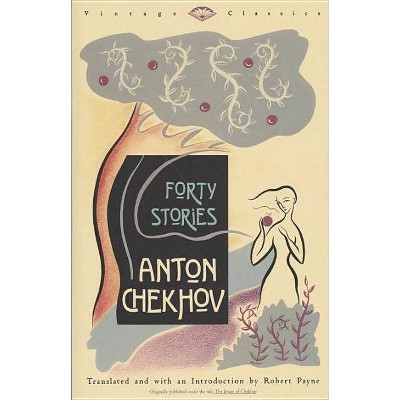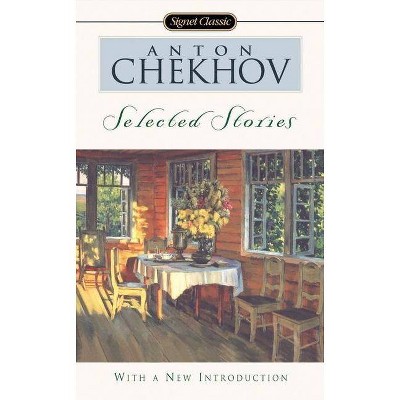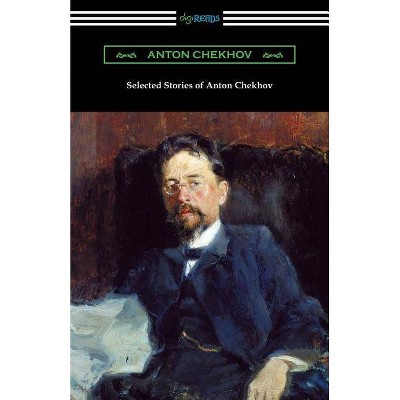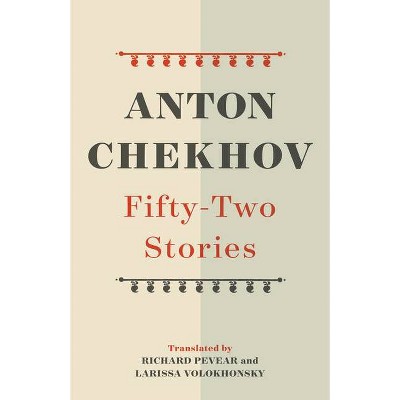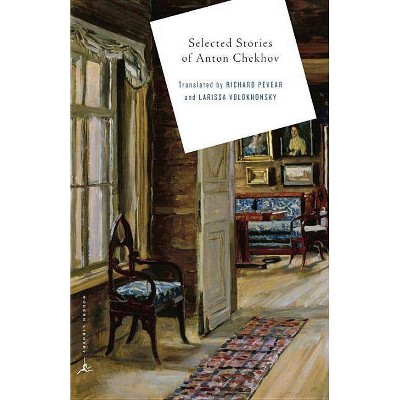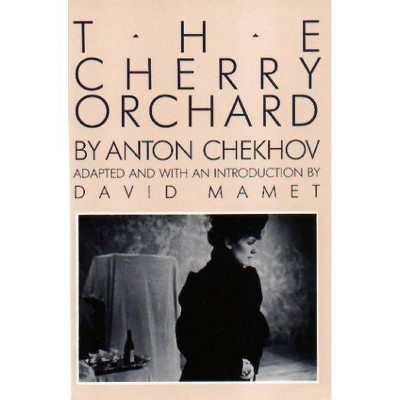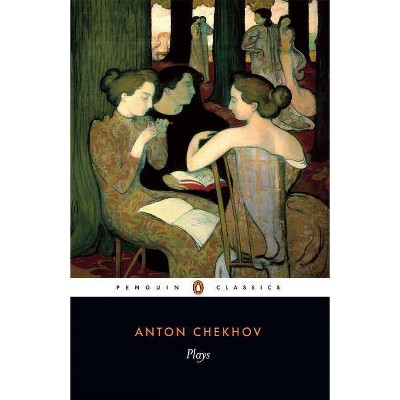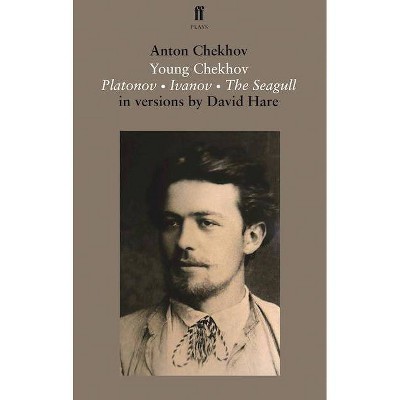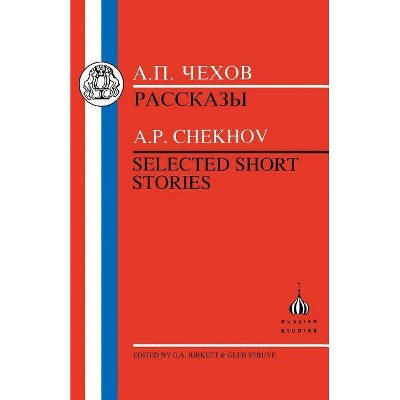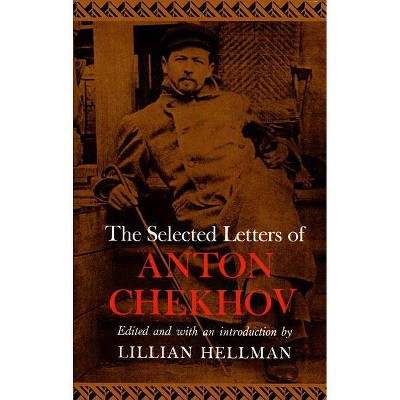Chekhov: Stories for Our Time - (Restless Classics) by Anton Chekhov (Paperback)
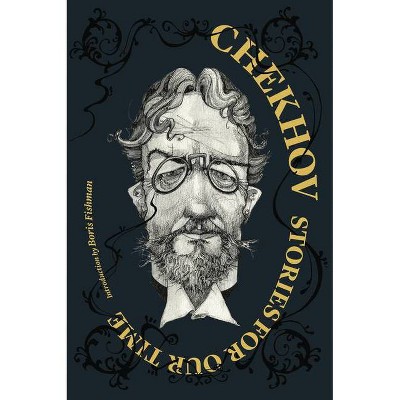
Similar Products
Products of same category from the store
AllProduct info
<p/><br></br><p><b> About the Book </b></p></br></br>Includes "A guide for restless readers": pages 346-348.<p/><br></br><p><b> Book Synopsis </b></p></br></br><p><b>The Restless Classics edition of <i>Chekhov: Stories for Our Time</i> presents a must-have collection by the great Russian author who captured humanity in all its complexity, and reintroduces Chekhov as a funny, playful, deeply human, and thoroughly modern writer.</b> <p/>The great 19th-century Russian author and playwright Anton Chekhov wrote nearly one thousand stories, a body of work that is unmatched in its alchemy of sensitivity, wisdom, precision, verve, soulfulness, and economy. Chekhov's sensibility was radically human and thoroughly modern: write not how you think things should be, but rather as they are. Universally recognized as one of the greatest short story writers of all time, he revolutionized the form and had a profound influence on his successors from Flannery O'Connor to Alice Munro. <p/> As the celebrated Russian-immigrant author Boris Fishman writes in his bold, incisive, and delightfully counterintuitive introduction to this Restless Classics collection, Chekhov is funny, optimistic, ceaselessly curious, and undogmatic--a significant break from the bleak and morally rigid tradition of his contemporaries Dostoevsky and Tolstoy. Unlike those peers born to privilege, Chekhov was raised in the peasantry and worked as a doctor. In his writing, he portrays the complexity of human beings as changeable and contingent, neither saints nor sinners--an approach intimately linked with his work as a clinician and humanitarian. <p/> Chekhov's humanity, just as much as his mastery of the writing craft, is potent medicine in times that seem so divided by ideology and antipathy for groups seen as "other." The first new selection of his work in over a decade, the Restless Classics edition of <i>Chekhov: Stories for Our Time</i> pairs beloved favorites with lesser known gems, all stunningly illustrated by Matt McCann: a perfect introduction for novices and a must-have for Chekhov devotees.</p><p/><br></br><p><b> Review Quotes </b></p></br></br><br><p>"Reading Chekhov, I felt not happy, exactly, but as close to happiness as I knew I was likely to come. And it occurred to me that this was the pleasure and mystery of reading, as well as the answer to those who say that books will disappear. <p/><b>--Francine Prose</b></p><br><br><p><b>Praise for Anton Chekhov: </b> <p/>"Chekhov's stories are as wonderful (and necessary) now as when they first appeared. It is not only the immense number of stories he wrote--for few, if any, writers have ever done more--it is the awesome frequency with which he produced masterpieces, stories that shrive us as well as delight and move us, that lay bare our emotions in ways only true art can accomplish." <p/><b>--Raymond Carver</b></p><br><br><p>"The revolution that Chekhov set in train--and which reverberates still today--was not to abandon plot, but to make the plot of his stories like the plot of our lives: random, mysterious, run-of-the-mill, abrupt, chaotic, fiercely cruel, meaningless.... Chekhov is the father of the modern short story and his influence is still massive and everywhere.... Katherine Mansfield and Joyce were among the first to write in the Chekhovian spirit, but his cool, dispassionate, unflinching attitude to the human condition resounds in writers as diverse as William Trevor and Raymond Carver, Elizabeth Bowen, John Cheever, Muriel Spark and Alice Munro." <p/><b>--William Boyd</b></p><br><br><p>"I heartily recommend taking as often as possible Chekhov's books and dreaming through them as they are intended to be dreamed through. In an age of ruddy Goliaths it is very useful to read about delicate Davids. Those bleak landscapes, the withered sallows along dismally muddy roads, the gray crows flapping across gray skies, the sudden whiff of some amazing recollection at a most ordinary corner--all this pathetic dimness, all this lovely weakness, all this Chekhovian dove-gray world is worth treasuring in the glare of those strong, self-sufficient worlds that are promised us by the worshippers of totalitarian states." <p/><b>--Vladimir Nabokov</b></p><br><br><p>"No one puts life onto the page as Chekhov does." <p/><b>--E. L. Doctorow</b></p><br><br><p>"These stories are inconclusive, we say, and proceed to frame a criticism based upon the assumption that stories ought to conclude in a way that we recognise. In so doing we raise the question of our own fitness as readers. Where the tune is familiar and the end emphatic--lovers united, villains discomfited, intrigues exposed--as it is in most Victorian fiction, we can scarcely go wrong, but where the tune is unfamiliar and the end a note of interrogation or merely the information that they went on talking, as it is in Chekhov, we need a very daring and alert sense of literature to make us hear the tune, and in particular those last notes which complete the harmony." <p/><b>--Virginia Woolf</b></p><br><p/><br></br><p><b> About the Author </b></p></br></br><p><b>About the Author: </b> <p/><b>Anton Pavlovich Chekhov</b> (1860 - 1904) was a Russian playwright and short story writer who is considered to be among the greatest writers of short fiction in history. The son of a grocer, he was born into a large family in Taganrog, Russia. As he studied in medical school, he supported the family by writing hundreds of stories under a pen name for local magazines. In his twenties, he shifted his focus to drama, writing plays that would signal the birth of modernism in theater: <i>The Seagull, Uncle Vanya</i> and <i>The Cherry Orchard</i>. Alongside his work as a doctor, he continued to write extraordinary short stories--nearly one thousand in all--until his death from tuberculosis at the age of 44. <p/><b>About the Introducer: </b> <p/><b>Boris Fishman</b> was born in the former Soviet Union and immigrated to the United States in 1988 at nine. He is the author of <i>A Replacement Life</i> and <i>Don't Let My Baby Do Rodeo</i> (HarperCollins), both <i>New York Times</i> Notable Books of the Year. He has won the Sophie Brody Medal from the American Library Association and the VCU Cabell First Novelist Award. His journalism, essays, and criticism have appeared in <i>The New Yorker</i>, <i>The New York Times Magazine</i> and <i>Book Review</i>, <i>The Guardian</i>, <i>Travel & Leisure</i>, <i>New York Magazine</i>, and many other publications. His next book is a work of creative nonfiction, a family history told through recipes. He lives in New York City and teaches creative writing at Princeton University. <p/><b>About the Translators: </b> <p/><b>Constance Garnett </b>was an English translator who rendered the great works of Russian literature in English during the first half of the 20th century. She was not only the first to translate Dostoyevsky and Chekhov into English, but also the complete works of Turgenev and Gogol and the major works of Tolstoy. <p/><b>Ilan Stavans</b> is the Lewis-Sebring Professor in the Humanities, Latin American and Latino Culture at Amherst College, publisher of Restless Books, and host of NPR's "In Contrast." <p/><b>Alexander Gurvets</b> was born in New York City and attended Amherst College, where he studied Russian and Mathematics. <p/><b>About the Illustrator: </b> <p/><b>Matt McCann</b> works at the photo desk <i>The New York Times</i>, where he's been working in one form or another since 2011.</p>
Price History
Cheapest price in the interval: 19.69 on October 22, 2021
Most expensive price in the interval: 19.69 on December 20, 2021
Price Archive shows prices from various stores, lets you see history and find the cheapest. There is no actual sale on the website. For all support, inquiry and suggestion messagescommunication@pricearchive.us
